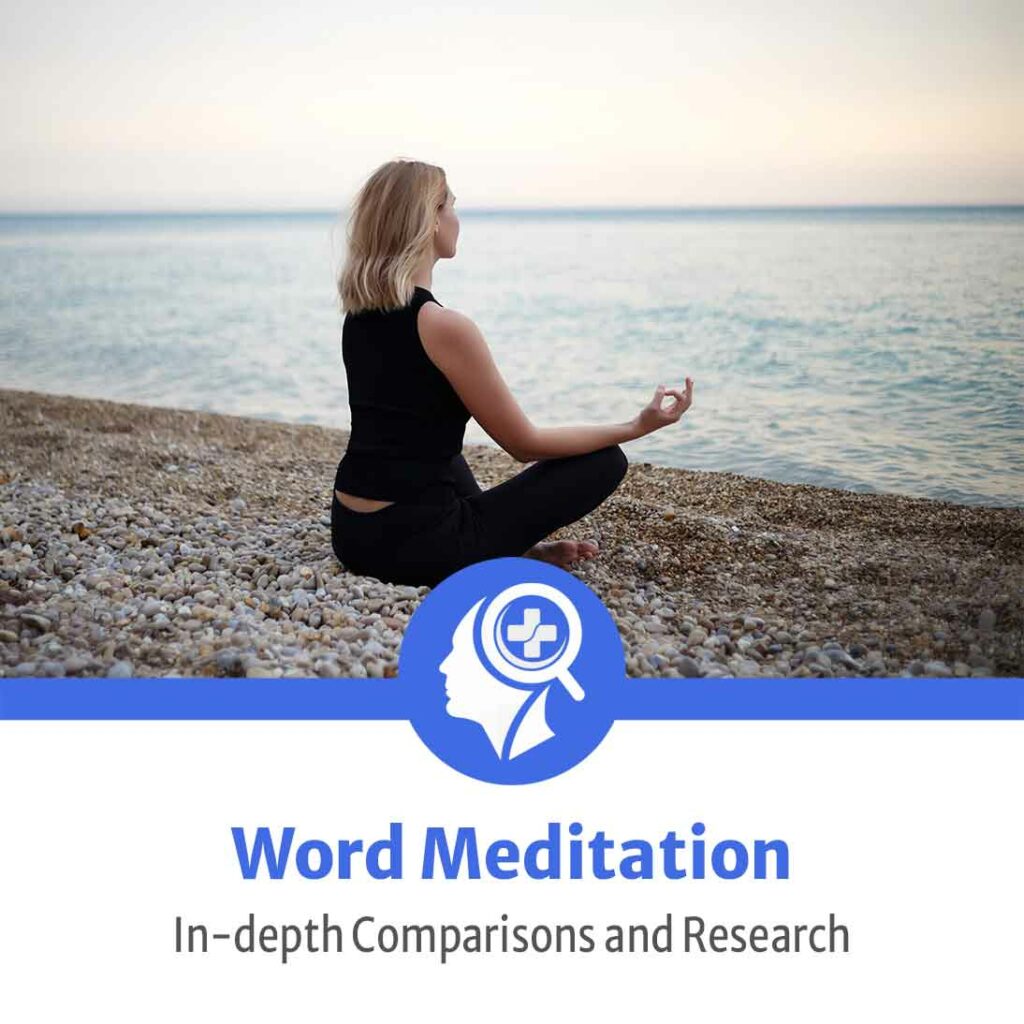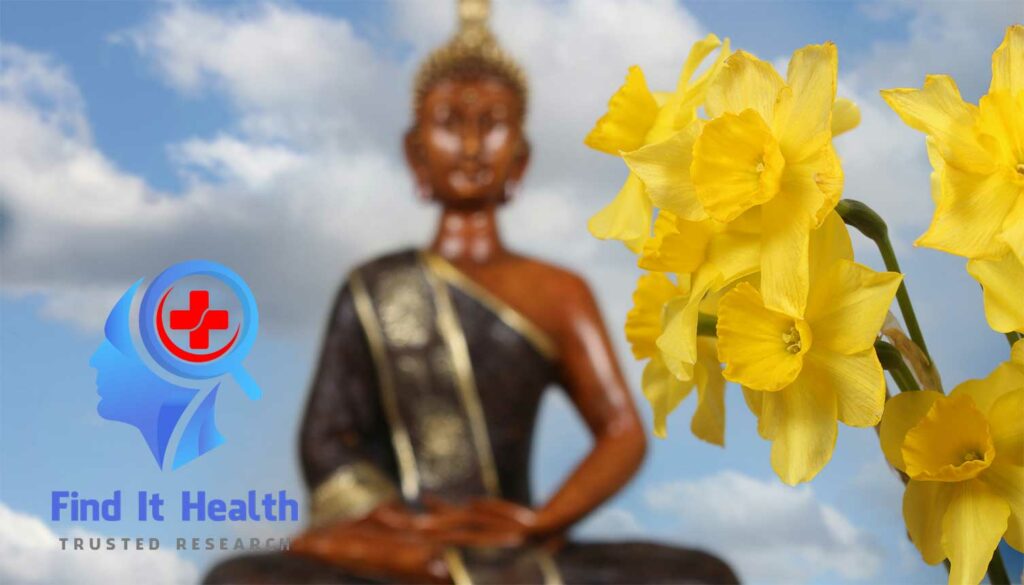
One-word Meditation is a self-care practice using a silent and calm state while repeating a single positive word. This form of meditation helps you to relax and nurture your mind into calm while instilling positivity. During practice, it is mostly about attaining mindfulness by focusing on saying your chosen word and increasing the gap between repetition. This page talks about how you can achieve an effective one-word meditation according to Find It Health research.
The Buddhist mantra meditation and one-word meditation are both synonyms. While you can chant phrases of a few words, a single word remains more effective. This is because your whole thought comes down to one word, helping you reap the true benefits of meditation.
To find balance in your chakra points, learn and practice the spiritual kundalini yoga exercise.

How to Practice One Word Meditation



One-word meditation is a meditation exercise where you repeat one single word while maintaining your calm and relaxed mind. The good thing about this meditation initiative is that it doesn’t require any form of procedure.
You can undergo this meditation while doing your house chores, sitting, or doing anything at all. You just have to choose a particular word and focus your mind on it. And try maintaining the gap and breathing while repeating the word. This will help you to drift away from your de-stress and relax your mind.
Learn and practice more self-care ideas for your well-being.
For a more guided approach to one-word meditation, you may follow these steps for beginners:
Step 1: Choose a Mantra
You have to first decide on the mantra or word to use for your meditation practice. Some of the mantras that you can choose from are the traditional Buddhism or Hindu mantras, Hare Krishna, Thich Nhat Hanh’s, Sanskrit, etc.
Step 2: Become Present
Before proceeding with one-word mindfulness meditation, it is important to be in the present. Try to forget about the things bothering you, your house chores, to-do list, etc. Focus on the word you chose for your practice and familiarize yourself with the rhythm.
Find It Health explores here the 7 weekly principles of mindfulness and how they can help you achieve peace.
Step 3: Repeat Your Chosen Mantra
Start chanting your chosen mantra once you feel present. It is always a better practice to repeat the mantra following consistent time gaps. However, it is not compulsory. You can decide to repeat the mantra each time you notice your mind wandering. Thus, bringing your attention back to the mantra brings back your mind, quieting your thinking.
Effective One Word Mantras for Mindfulness Meditation



For a more traditional one-word meditation practice, you can choose from the following Sanskrit mantras:
One Word Sanskrit Mantras
· Lam
This mantra brings peace and stability to your life. Use Lam in your meditation when you feel that things are falling apart. It will help open up your root chakra, heal, and restore balance. This is because Lam is the first seed mantra corresponding to the root chakra.
· Vam
Chanting “Vam” opens up your emotions and reveals your creative side. This is because it corresponds to the sacral chakra. Use this seed mantra when you feel lonely and isolated.
· Ram
Choosing Ram as your meditation word will help to boost your confidence. It is the third of the seed chakras and corresponds to the solar plexus chakra. So, use “Ram” when you feel low and need to heal the third chakra (solar plexus).
· Yam
Continuously chanting “Yam” balances your feeling of empathy, boosts self-love and love for others. It is the seed mantra corresponding to the heart chakra. Choose this mantra when you need to heal your heart chakra and bring balance to your empathetic side.
· Ham
Ham is a seed mantra also chanted as Hum, that helps to restore your truth. Hence, this is the right mantra when you find it difficult to speak your truth. Or, when you talk more than you listen. Ham corresponds to the throat chakra which is the center of personal truth.
· OM
This is a popular Sanskrit mantra also written as Aum. Chanting this mantra in a transcendental meditation practice helps you connect with your higher self. This mantra also helps you to “clearly see” (vipassana) the truth and let go of your attachments because it corresponds to the third-eye and crown chakras. OM is the last seed chakra.
· Shanti
Shanti is Peace. Zen Buddhists chant this mantra to bring complete peace, even to those unexciting aspects of daily life. Most yoga classes chant Shanti at the beginning or the end of their practice.
· Sukha
Sukha refers to a feeling of ease. Chanting this mantra, therefore, brings a feeling of ease, happiness, and joy. Use this mantra to restore balance in those moments you feel uneasy and tensed as if you are forcing things your way.
· Sahas
Sahas or Ojas portrays vibrancy. This is a mantra for health and well-being. It carries the energy that helps you tap into a sound mind and experience a healthy body. Using this mantra when you feel sick or down will make you feel better.
· Ananda
This mantra represents bliss. Repeating Ananda inspires joy and a feeling of ease. Chanting this mantra in a meditative state works magically and tends to bring instant happiness. You may try it out in your next practice if you want to experience bliss.
Use these evening journals prompts to help you wind down better at night.
One Word English Mantras
If you are not familiar with the Sanskrit mantras, here are powerful English mantras that you can use for your practice:
· Grateful
This improves your feeling of gratitude, making you feel contented.
· Love
You can chant “love” to improve your self-love and the love you have for your surroundings.
· Abundance
Repeating this word will help in dismissing your feelings of want, making you abundant.
· Peace
To feel more in control and peaceful, chant “peace” your practice.
· Growth
For progress and productivity, this is the mantra to use.
· Freedom
Break the chains of mind captivity by chanting “Freedom” in your practice.
· Presence
This will help you become present and live in the moment. It stabilizes your blood pressure and brings calm to your wandering mind.
· Courage
Use this word as a mantra to strengthen your mind when facing difficulties.
· Flow
When you experience turbulence, chanting “Flow” can help bring stability.
· Breathe
This inspires you to take more deep breaths, giving you control over your body and mind. Improve your overall daily experience by adopting these easy morning routine practices selected by Find It Health.
Meditation Words to Relax and Relieve Stress

Here are meditative words that can help you relax and relieve stress:
· Breathe
Stop whatever you are doing, take a deep breath, then slowly breathe out. Repeat this exercise while focusing your mind on the word “Breathe”. This is effective in calming a stressed and anxious mind.
· Easy
Tell yourself you got this! Repeating the word “Easy” will bring a feeling of ease and let your mind and body relax.
· I Can
Shun the feeling that you can’t by repeating and meditating on “I can”. Assure yourself that you can do it till you are able to.
· Freedom
Calmly say to yourself, “I’m free from fear, sadness, and uneasiness”. Concentrate and get yourself together while meditating with “Freedom”.
· Peace
Whatever is the cause of your stress and anxiety, bring calm to it by repeating “Peace” as your mantra.
· Grateful
Count your blessings and repeat the word “Grateful” to encourage happiness and joy. This will help you to relax and loosen up.
Visit this Find It Health page to find out the meditation specifically for stress and anxiety.
One Word Mantras for Athletes

Here are one-word mantras for athletes to keep you pushing hard and focused when you feel like giving up:
· Push
Use this word to remind yourself of the need to keep going no matter the situation.
· Go
“Go” will help push you into starting whatever it is you already wish to achieve.
· Fast
Yes! You can do better. Inspire yourself by repeating “Fast” as you go.
· Speed
Chant this word whenever you feel you are slowing down or not moving as quickly as you wish.
· Yes
When you are on top of your game, repeat “Yes” to enhance your feeling of progress.
· Harder
Saying “Harder” repeatedly can make you come in stronger. Use this often as an athlete to help you do better. You can recover your tired muscles after an exercise by soaking in Epsom salt. Here is research on the benefits of Epsom salt by Find it Health.
Frequently Asked Questions on Mantras


What are the 3 types of meditation?
Meditation can be grouped into three main types. Here are the 3 main definitions of meditation:
Concentration meditation: This meditation technique involves trying to focus your attention on a particular activity or object. The goal is to draw energy from your point of focus reaching for a higher state of being. Your focus could be on your breath, word/mantra, or meditation stones/crystals.
Go deeper into stones and crystals meditation practices and how they can help in balancing your chakra points.
Visualization meditation: An image that creates a particular feeling or quality is brought to mind. It is more like imagining a beautiful ocean, sky, or green land that can keep your mind at peace. The best Visualization meditation is practiced with the eyes closed.
Mindfulness meditation: Mindfulness is the state of opening up yourself to see the light, become aware, and accept the way things are. It is a type of meditation to deal with various mental health, physical health, and emotional health issues through mindfulness-based stress reduction.
What is meditation one word?
This is the act of relaxing and calming your mind by slowly and gently repeating one single word. In practice, paying attention to the gaps between saying the word is also advisable.
What words describe meditation?
Here are words synonymous with meditation:
· Contemplation
· Pondering
· Self-examination
· Concentration
· Deep thought, etc.
Conclusion – Research by Findithealth.com


One-word meditation is an effective practice to trim down your thoughts while drawing the energy in a single word. Therefore, if you ever see yourself feeling disorganized, take out time to try this practice. Find It Health already provided in this article an ultimate guide to one-word meditation. Remember to choose words that will help you achieve your goals!
Find out more about one-word meditation in this research book “The Middle-length Discourses of the Buddha”.

